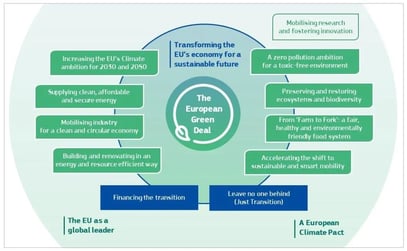Zero greenhouse gas emissions until 2050
The European Green Deal Communication (COM(2019) 640 final) lays out the European Commission’s plans for a complete and comprehensive transformation of the EU’s economy until 2050. It entails several goals directed at providing a basis for a more sustainable Europe, which also includes the topic of circular economy. The communication itself states that it “aims to transform the EU into a fair and prosperous society, with a modern, resource-efficient and competitive economy where there are no net emissions of greenhouse gases in 2050 and where economic growth is decoupled from resource use.”
To achieve these goals, a fundamental shift within our culture as well as within our economy is needed. The Green Deal comprises eight strategic pillars with two connecting elements.

Green Deal: Circular Economy as one strategic pillar
As set out in the taxonomy regulation (Reg (EU) 2020/852) and the Circular Economy Action Plan (CEAP) (COM(2020) 98 final) the circular economy is a major driver of European environmental and climate ambitions. While the taxonomy regulation includes the circular economy as one of six main drivers of sustainable business and lays down the definition for a contribution to a circular economy, the CEAP determines the regulatory path towards achieving circularity in a broad range of sectors.
Circular economy in the taxonomy regulation
Within the Green Deal, circular economy is defined in Article 13 and 17 of the taxonomy regulation. There you can find an exhaustive list of defined impacts, which can contribute to or impede the development of a circular economy. Therein, Article 13 defines contributions, while Article 17 defines impediments to all of the six main drivers, including impediments to the circular economy.
For companies trying to comply with article 13 of the Taxonomy Regulation, ifu Hamburg provides both innovative software solutions and consulting services.
When trying to act on increasing resource efficiencies, prolonging product life cycles, reducing waste generation, reducing the use of hazardous substances and a multitude of other aspects of circularity that are covered by Article 13 of the taxonomy regulation, Life Cycle Assessments can provide the information necessary to take the right actions to succeed in these efforts. Furthermore, they can also serve to confirm the positive impact of actions taken and lend credence to claims of circularity.
Similarly, Life Cycle Assessments can also provide proof that article 17 is not violated by an action that aims to address one of the other five drivers laid down in the regulation. A legitimate Life Cycle Assessment process is integral to compliance with the Taxonomy Regulation and can thereby greatly improve attractiveness of a business in the eyes of investors. Life Cycle Assessments can also serve as proof of non-violation of the other aspects under Article 17.
Umberto LCA Software puts the tools in the hands of our customers and provides them with an intuitive software that makes it easy to visualize the resource flows within their production processes. For those who lack the capacities or prefer to make use of the experience of our consulting team we also offer services to take the work off your back and provide you with expert knowledge to make sure you make the right changes.
The Circular economy Action Plan
While the Taxonomy Regulation lays down general rules across all industries, the CEAP includes more specific plans for action in more specific industries. Special focus lies on the Electronics and the Information and Communication Technology (ICT) sector, batteries and vehicles, packaging, plastics, textiles, construction and buildings and finally food, water and nutrients. For all these the CEAP provides several key strategies to improve circularity of production and consumption processes, making the continuous inclusion of Life Cycle Assessments an inescapable future part of these industries.
Those taking the plunge before anything is signed into law will be set to have a head start over their competitors and will be more resilient to political pressure down the line. Once again, we at ifu Hamburg provide both software solutions and know-how to be ahead of the curve and beat out the competition on the road to circularity.
Whether your company is active in one of the sectors mentioned above or not, the Circular Economy Action Plan will have a direct or indirect effect on your business eventually, either now or in the future. As the Commission has stated that it aims to expand the strategy in future revisions to include more sectors and actions, building a sustainable circular economy now will prepare you for the changes to come.






